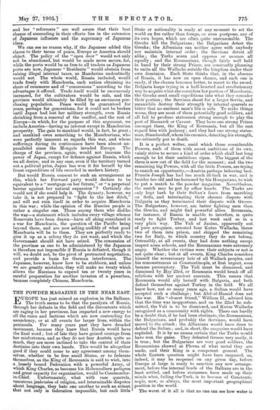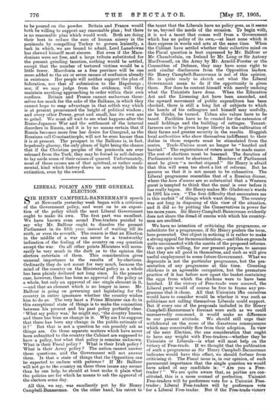Tub POWDER MAGAZINE IN THE NEAR EAST.
11:4-1UROPE has just missed an explosion in the Balkans. 'A The truth seems to be that the paralysis of Russia, through her defeats in the field. and the discontents which are raging in her provinces, has imparted a new energy to all the races and factions which are now contending for ascendency, or at all events for larger lives, within the peninsula. For many years past they have dreaded movement, because they knew that Russia would have the final word ; but of late they have gained courage from her misfortunes, and as they do not fear Austria quite so much, they are more inclined to take the control of their destinies into their own hands. This would be altogether good if they could come to any agreement among them- selves, whether to be free small States, or to federate themselves, as the King of . Roumania is said to wish, into a loosely beand Federation with a powerful Army, of which Niue; Charles, as becomes his Hohenzollern pedigree and great capacity for organisation, would be Commander- in-Chief. Unfortunately, what with race quarrels, Teaomous jealousies of religion, and interminable disputes about language, they hate one another to such an extent that not only is federation impossible, but each little its own hopes, which are often quite unreasonable. The Greeks kill the Bulgarians ; the Bulgarians detest the Greeks ; the Albanians can neither agree with anybody nor maintain internal order ; the Servians detest all alike ; the Turks scorn and oppress or menace all equally ; and the Roumanians, though fairly well held in hand by their strong Prince, are constantly planning to unite all the Wallachs outside the kingdom under their own dominion. Each State thinks that, in the absence of Russia, it has now an open chance, and each one is ready, if the chance becomes better, to resort to the sword. Bulgaria keeps trying in a half-hearted and revolutionary way to acquire what she considers her portion of Macedonia; the Greeks send small expeditions into what they consider their portion ; the Servians shout for a larger Servia, and meanwhile destroy their strength by internal quarrels so bitter that no eminent man's life is safe. To make things worse, they are most of them potentially good soldiers, and.
all fail to produce statesmen strong enough to play the part of Bismarck or Cavour. They have one strong Prince amongst them, the King of Roumania, but all the rest regard him with jealousy ; and they had one strong states- man, Stambouloff,whom his enemies, detecting his strength, incontinently put to death.
It is a perfect welter, amid which three considerable Powers, each of them with secret ambitions of its own, vainly strive to secure a kind of order which shall last long enough to let their ambitions ripen. The biggest of the three is now out of the field for the moment; and the two remaining big Powers, with all the little Powers, are trying to snatch an opportunity,—Austria perhaps behaving best.. Francis Joseph has had too much ill-luck in war, and is besides too old and too harassed by his Hungarians, to wish to put a match to the powder magazine. Nevertheless, the match may be put by otter hands. The Turks are only kept back by their Sultan's fears from marching on Sofia, and terminating their chronic dispute with Bulgaria as they terminated their dispute with Greece. The Bulgarians, however, are better fighting men than, the Greeks, and might find powerful allies. Roumania, for instance, if Russia is unable to interfere, is quite, ready to fight Turkey, and last week said so in a very plain way. The Vali of Janina, apparently out of pure arrogance, arrested four Kutzo Wallachs, threw two of them into prison, and. shipped. the remaining two for Italy, to which country they do not belong. Ostensibly, at all events, they had done nothing except, inspect some schools, and the Roumanians were extremely. angry. Whether the victims were their subjects or not is not quite clear; but at all events, King Charles considers, himself the reversionary heir of all Wallach peoples, and his remonstrances at Constantinople, at first urgent, soon became peremptory. The Vali must be dismissed, and dismissed by May 23rd, or Roumania would break off all relations with her ancient suzerain. This means that Roumania would ally herself with Bulgaria, and both defend themselves against Turkey in the field. We all know how, not so many years ago, a Sultan would have accepted such a challenge ; but Abd-ul-Hamid does not like war. His "closest friend," William II., advised him that the time was inopportune, and. on the 22nd. he sub- mitted, the Vali is to be dismissed, and Kutzo Wallachs recognised as a community with rights. There can hardly be a doubt that, if he had been obstinate, the Roumanians, the Bulgarians, and probably the Servians, would have moved. to the attack ; the Albanians would have risen to defend the Sultan ; and, in short, the magazine would have exploded. It is by no means certain that the Turks would have won the game. They defeated Greece very easily, it is true ; but the Bulgarians are very good soldiers, the Roumanians showed at Plevna of what metal they are made, and their King is a competent general. The whole Eastern question might have been reopened, as,. indeed, it may be reopened on any given day, before Europe at large is ready to sanction any new arrange- ment, before the internal feuds of the Balkans are in the. least settled, and. before statesmen have made up their minds what, failing the Turk, is to become of Constanti-, nople, now, as always, the. most important geographical position in the world.
The-worst of it all is that no one can see how water is to be poured on the powder. Britain and France would both be willing to support any reasonable plan ; but there is no reasonable plan which would work. Both are doing their best to reduce the sum of human misery in the peninsula by compelling Turkey to govern leniently, a task in which, we are bound to admit, Lord Lansdowne has showed himself most sincere. But even if the Mace- donians were set free, and a large tribute substituted for the present grinding taxation, nothing would be settled, except that the number of tortured victims would be a little fewer. Macedonia as a free province will be one more added to the six or seven causes of confusion already in existence. Her people will neither support the plan of federation, nor that of submission to the Hapsburgs ; nor, if we may judge from the evidence, will they maintain anything approaching to order within their own confines. Britain and France cannot embarrass them- selves too much for the sake of the Balkans, in which they cannot hope to reap advantage in that selfish way which is at present pronounced the height of political wisdom ; and every other Power, great and small, has its own axe to grind. We must all wait to see what happens after the Russo-Japanese War and the settlement of the internal disorders in Russia, and it is by no means certain that if Russia becomes more free her desire for Czargrad, as the Russians call Constantinople, will not be even keener than it is at present. The prospect in the Balkans is, in fact, hopelessly gloomy, the only gleam of light being the chance that if the Christian peoples of the peninsula are ever released from the Turk, they may be forced in self-defence to lay aside some of their causes of quarrel. Unfortunately, most of those causes are of that spiritual, or rather senti- mental, kind which history shows us are rarely liable to extinction, even by the sword.







































 Previous page
Previous page